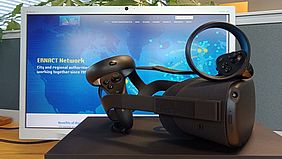We are delighted to announce that DISTINCT has kick-off! The lead partner, the ERNACT network (Ireland), will coordinate activities with Karelia University of Applied Sciences (Finland) and Umeå University (Sweden).
The three partners will explore the usage and benefits of Disruptive Technologies, including, use of Virtual Reality (VR), Internet of Things (IoT), Artificial Intelligence (AI) and Blockchain in health and social care, environmental management, and training. Partners will work together to jointly achieve project’s main result: three Northern Periphery and Arctic regions with significantly enhanced capacity to deliver future-proof viable public services using disruptive technologies as a result of increased awareness, preparedness and innovation planning.
“The universities, clusters, research centres and knowledge/innovation centres in the NPA tend to be located in a limited number of larger cities or towns. This is exacerbated by the fact that the disruptive technology capacity of these types of organisations in the NPA is still in its infancy, with different specialisms in different locations”, explains ERNACT General Manager Colm Mc Colgan. He mentions that, “an intelligent application of disruptive technologies can save costs, increase viability, improve use of scarce human resources, span distances and improve decision making”. However, even though the multiple benefits of using this kind of technologies, the small number and concentration of disruptive technology research and innovation centres, allied with low levels of awareness, present serious blocks to realising this improvement.
Territorial challenges
The three areas present some common territorial challenges related to delivering public services in peripheral regions: high costs of delivery, restricted capacity for R&D and its exploitation, youth out-migration and brain drain, ageing, skill shortages, sustainable exploitation of natural resources and costs of managing climate change. All of them will be tackled by the project, very relevant in the three areas because of their different maturity levels in disruptive technology in public service delivery. “North Sweden, with three universities, possesses significant disruptive technology research and innovation capacity and breadth. North Karelia, with one university, is ahead of the Irish Border Region, which has an applied university only. All three regions are trialling a limited range of the technologies in research, EU projects and pilots for companies”, explains Jose Manuel San Emeterio, Programme Manager at ERNACT and DISTINCT Project Leader.

